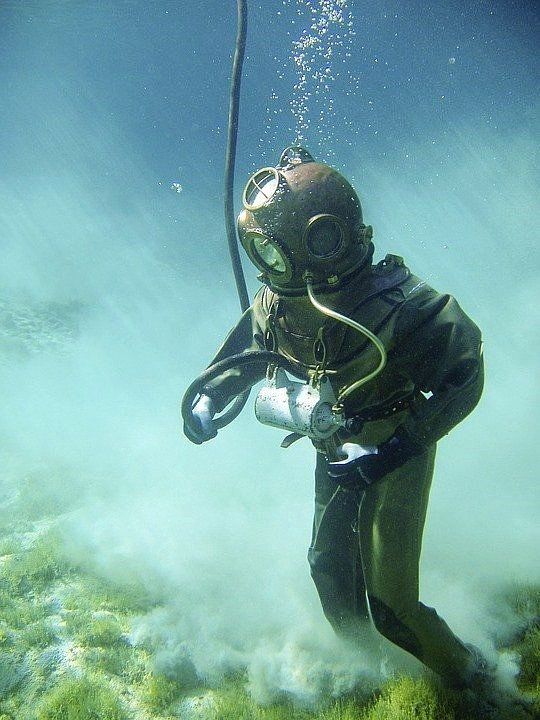History of diving
There is evidence that freediving has been practiced for thousands of years to get food or riches (pearls or coral, for example) and also for military purposes. Scuba diving, using helmet and breathing air supplied from the surface, began to develop throughout the second half of the eighteenth century but especially from the early nineteenth century and today continues to resort to similar techniques. However, the scuba diver limits the diver's mobility because the diver stays connected to the surface by an air hose.
The search for autonomy by inventors (autonomous diving is one that does not require any connection with the surface) produced throughout the nineteenth century some inventions of limited effectiveness. But it was not until 1942 that the technology was going to take a giant leap and allow the man to dive completely independently of the surface. Thanks to Jacques-Yves Cousteau who was a French naval officer, explorer and researcher who studied the sea and various forms of life known in the water. Cousteau is especially remembered for having been in 1943, together with Émile Gagnan, the co-inventor of the regulators still used today in autonomous diving.

Diving is relaxing and fun
Our philosophy
The first contact with the aquatic environment is very important because it creates fun, passion and finally a respect for the Fauna and Flora. That is our philosophy and our way of working, which we transmit to our divers. From us you will receive the theoretical and practical knowledge necessary to safely develop and enjoy this wonderful underwater world. You will know many new immersion points full of life and even some archaeological site in an intact Fauna and Flora.
PADI / S.U.B. diving courses
S.U.B. Freediving
The ability to hold your breath for a long time begins in your head: Use techniques such as yoga, stretching, progressive muscle relaxation, breathing techniques, NLP, the autogenous training and soon realizes that two minutes of breathless silence under the water are no longer a problem. The practice of apnea can be a good ally by reducing the daily stress situations.
Scuba Diver / S.U.B. Basic Diver
It is for people who dive little or do not have time to complete the full course of diving. Once certified, you can only dive in the company of a qualified Professional such as the Instructor, Assistant Instructor or a diving guide.
Open Water Diver / S.U.B. Diver *
In this course you receive all the necessary theoretical and practical knowledge to function autonomously and safely in the underwater environment.
Advanced Open Water Diver / S.U.B. Aowd
This course is designed to advance your diving, so you can start immediately after obtaining your Open Water Diver certification. The course helps develop confidence and expand your diving skills through different adventure dives. You try different specialties while you gain experience under the supervision of your Instructor. Record dives and develop skills as you find new ways to have fun diving.
Rescue Diver / S.U.B. Diver **
Here you learn to prevent and manage problems in the water and become a more confident diver with your skills, knowing that you can help others if they need it. During the course, learn to become a better partner by practicing problem solving techniques until it becomes second nature. In addition, being focused on learning, the course is fun and allows a lot of laughter.
Divemaster / S.U.B. Diver ***
The Divemaster course is the first level of professional training. Working closely with an Instructor, you will perfect your diving techniques, how to master the motionless flotation effortlessly, and improve your rescue techniques so that the most common problems are easily anticipated and resolved. It will increase your diving knowledge, your management and supervision capabilities so that it becomes a model for divers all over the world.
As a Divemaster, he will guide other divers when supervising diving activities and help with diver training.
Assistant Instructor / S.U.B. Dive leader professional
If you have affinity with people, passion for diving and want an extraordinary life, become an Assistant Instructor. Teaching to dive allows you to share your love for the underwater world with others while doing and enjoy what you love most, being underwater.
As an Instructor Assistant you can perform, assist and guide diver training dives. Provide snorkeling courses and pool diver.
Specialty courses
* Nitrox
* Navigation
* Deep diving
* First aid
* Buoyancy in perfection
* Night dive
* Underwater digital photography
Diving for children
3 Snorkel courses in the pool from 8 years old until 11 years old.
1st course, bronze diploma
2nd course, silver diploma.
3rd course, gold diploma.
Scuba Diver diving courses for young people from 12 years old up to 14 years old. Depth restricted according to age.
Diving places
Our diving area expands along the Costa de la Luz between the Bay of Cádiz and Tarifa.
Dive baptisms in the pool and in the sea.
Diving from coast and from boat.
Important
To be able to dive it is mandatory to provide a medical report of physical aptitudes that does not exceed one year. It is also mandatory to have a liability insurance for diving that is in force. This insurance is possible to acquire through our Club.















